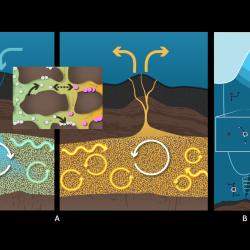UMD Astronomers Honored with American Astronomical Society High Energy Astrophysics Division Awards
The University of Maryland’s Department of Astronomy made a stellar showing in the American Astronomical Society’s 2022 High Energy Astrophysics Division (HEAD) Awards.
Associate Research Scientist Keith Arnaud was honored with the 2022 HEAD Innovation Prize, which recognizes the development of foundational, innovative and/or revolutionary instrumentation or software tools that have led to groundbreaking results in high-energy astrophysics.
Adjunct Associate Professor Brad Cenko was awarded the 2022 HEAD Mid-Career Prize, which recognizes a significant advance or accomplishment (observational or theoretical) in high-energy astrophysics by an individual astrophysicist within 15 years of receiving their Ph.D.
Keith Arnaud
Arnaud, whose research interests include clusters of galaxies, active galactic nuclei, astrostatistics and computational methods, received the 2022 HEAD Innovation Prize “for continuous innovation in developing and maintaining XSPEC, the X-ray spectral fitting package, which has become the world standard for analysis of spectra from X-ray and gamma-ray missions.”
“The award was a total surprise,” Arnaud said. “It’s a relatively new prize so I’m only the second person to win it. It’s always nice to get recognition and to have people tell you what you do matters to them.“
With a joint appointment as a staff member in the High Energy Astrophysics Science Archive Research Center at NASA’s Goddard Space Flight Center (GSFC), Arnaud has been working on XSPEC and the analysis of energy spectra for more than 35 years. The XSPEC package has been used by astronomers on six continents and in more than 12,000 refereed publications.
“This is mainly X-ray astronomy. We’re looking at X-ray observations of things in the universe,” Arnaud explained. “And one of the fundamental ways you learn about things is by spectroscopy, the relative numbers of X-rays that arrive at particular energies. It can tell you things about the physics of what’s going on. I teach people around the world about how to do this stuff, which I enjoy.”
Educated in the United Kingdom, Arnaud earned his undergraduate degree in mathematics and a Ph.D. in astronomy from the University of Cambridge before moving to Massachusetts where he received a Herchel Smith Scholarship from Emmanuel College followed by a Harvard-Smithsonian Center for Astrophysics Postdoctoral Fellowship. Arnaud joined UMD and GSFC in 1988. He worked on the Astro-1 space shuttle mission and then collaborated with colleagues in Japan on the ASCA, Suzaku and Hitomi X-ray astronomy satellites.
In 2001, Arnaud co-founded a series of U.S. X-ray astronomy schools to introduce graduate students and postdocs to the practical side of X-ray astronomy and wrote "Handbook of X-ray Astronomy," which was published by Cambridge University Press. Arnaud has also participated in many Committee on Space Research (COSPAR) Capacity Building Workshops, which are designed to build expertise in space-based science in countries and regions that may not currently have active programs.
Arnaud is a Fellow of the Royal Astronomical Society and a member of the AAS. He received the Astronomical Society of Japan’s Excellent Paper Award in 2012 and has also been honored with 10 NASA or GSFC group achievement awards. He is the author or co-author of over 70 refereed publications and his refereed and non-refereed publications have almost 13,000 citations.
Brad Cenko
Cenko was awarded the 2022 HEAD Mid-Career Prize for his ongoing work as a research astrophysicist at NASA’s Goddard Space Flight Center (GSFC), specifically for his “outstanding leadership, discovery and characterization of high-energy transient phenomena from tidal disruption events, counterparts to gravitational wave mergers, and gamma-ray bursts.”
“The award was a tremendous surprise,” Cenko said. “Looking at the list of past winners, it comes as a bit of a shock to see yourself listed with people that you have looked up to for some time in your career. Of course, that is part of what makes it gratifying.”
In his work, Cenko studies cosmic explosions including gamma-ray bursts, supernovae and tidal disruption events, which provide a laboratory to test the laws of physics that can’t be replicated on Earth.
“Honestly a big part of the excitement of my job is that we get to look for things that people haven’t seen before, and try to piece together what is happening, kind of like a detective,” Cenko explained. “The process of scientific discovery is really the reward in itself!”
Cenko earned his bachelor’s degree in astronomy and astrophysics from Harvard University and his Ph.D. in physics from the California Institute of Technology. He was a postdoctoral scholar at UC Berkeley before joining UMD and NASA in 2013.
“Working at NASA, you quickly realize that the only way to realize the scope of our ambitions is with a first-class team,” Cenko said. “More than anything, this award is a testament to how fortunate I’ve been to have such wonderful colleagues—students, postdocs, collaborators, mentors and friends—and to work with such incredible teams, in particular the Neil Gehrels Swift Observatory and the Zwicky Transient Facility.”
Cenko currently serves as principal investigator for the Neil Gehrels Swift Observatory, a NASA satellite dedicated to the study of gamma-ray bursts and other transient/variable sources. He is also chair of the Science Steering Committee for the Zwicky Transient Facility, a wide-field optical transient survey located on Palomar Mountain in California.
Cenko received the 2015 Robert H. Goddard Award for Scientific Achievement, was honored as a 2015-2016 Research Corporation Scialog Fellow, and has been a Joint Space-Science Institute Junior Fellow since 2013. He is the author of over 400 publications.
###
Media Relations Contact: Leslie Miller, 301-405-9267, lmille12@umd.edu
University of Maryland
College of Computer, Mathematical, and Natural Sciences
2300 Symons Hall
College Park, MD 20742
www.cmns.umd.edu
@UMDscience
About the College of Computer, Mathematical, and Natural Sciences
The College of Computer, Mathematical, and Natural Sciences at the University of Maryland educates more than 9,000 future scientific leaders in its undergraduate and graduate programs each year. The college's 10 departments and more than a dozen interdisciplinary research centers foster scientific discovery with annual sponsored research funding exceeding $200 million.









